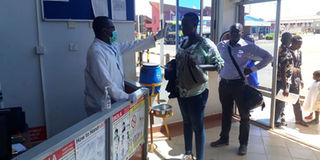Experts call for Ebola vigilance countrywide

Travellers are screened for the Ebola virus before getting into Kenya at the Busia One Stop Border Post on June 12, 2019. Experts have asked Kenyans to be vigilant, not fearful, as Ebola cases in neighbouring Uganda continue to rise.
What you need to know:
- Experts have asked Kenyans to be vigilant, not fearful, as Ebola cases in neighbouring Uganda continue to rise.
- This comes days after a suspected case in Kakamega County caused panic among residents.
- So far, the Health Ministry of Uganda has announced about 38 confirmed cases and about eight deaths attributed to the disease.
Experts have asked Kenyans to be vigilant, not fearful, as Ebola cases in neighbouring Uganda continue to rise.
This comes days after a suspected case in Kakamega County caused panic among residents.
So far, the Health Ministry of Uganda has announced about 38 confirmed cases and about eight deaths attributed to the disease.
In Mumias sub-county, where the first suspected case in the country is still in isolation, normalcy has resumed after the Health ministry announced that the patient’s result was negative.
Before then, some residents who spoke to the Nation said they were anxious.
“I have noticed that some people have avoided going to the St Mary’s Hospital, and some wish that the patient was taken to the Level 4 hospital where Covid-19 patients were isolated during the pandemic.
“I have also noticed that some things that we get from Uganda like fish from Busia are not available, maybe it is fear, but the negative test has given us some relief,” Beatrice Auma, a resident of Mumias, said on phone.
“We hope that screening will be taken with the seriousness it deserves even here in Mumias since we have many people from Uganda coming in,” she added.
The resident’s concern is backed by the latest policy brief from the Lake Region Economic Bloc (LREB), which vouches for disease surveillance for other counties, not just those in the border areas.
LREB’s Dr Shem Otoi advised Ministry of Health officials not to ignore interior counties in the fight against Ebola.
“We realised most diseases are detected at the border yet it is important to continue the surveillance in other high-risk counties. If someone is screened at the border and detection of the virus has escaped, they need to be followed up in whatever county they go to.
“The LREB region has about 67 unofficial border points and these are likely to spur community transmission in the country if we do not enhance testing capacities in in-country counties,” he said.
High-risk counties
The Health ministry last week identified 20 counties likely to get Ebola infections, most of which are in the western region.
At a past meeting with journalists, acting Health Director General Patrick Amoth said closing the borders is not a viable solution and instead urged residents to notify health and security officials should anyone use an unofficial route to come into the country.
Dr Ahmed Kalebi, a consultant pathologist, explained that the main difference between Ebola and Covid-19 is that the latter is mostly a respiratory infection while Ebola is transmitted through direct contact with someone or body fluid from an infected person.
“The most important prevention for Ebola is not to come into direct or indirect physical contact with a person who is infected without personal protective gear. People should avoid handshakes, hugs, kisses, sex, cleaning the infected, handling or sharing utensils or such other items they might have handled.
“Also people need to wash hands thoroughly and as frequently as possible throughout the day as one might have touched a door handle or railing or other item touched by an Ebola-infected person. Most critically is not to handle an infected or deceased person without gloves and other protective gear. That is why home care for Ebola-suspected individuals or those confirmed is a big no,” he said.
He explained that all forms of body fluids are potentially infectious.





